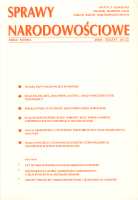Klasy, narody i rasy Karola Marksa i Fryderyka Engelsa refleksja o nacjonalizmie
Classes, Nations and Races. Karl Marx's and Frederick Engels's Reflection on Nationalism
Author(s): Krzysztof JaskułowskiSubject(s): History
Published by: Instytut Slawistyki Polskiej Akademii Nauk
Summary/Abstract: The aim of this article is to analyse an approach of Karl Marx and Frederick Engels to nationalism and related phenomena like nation-state, national movements, ethnicity and race. These two theoreticians are usually regarded founding-fathers of social sciences and their ideas influenced many contemporary thinkers. In the field of nationalism studies there is a group of scholars who attempt to develop Marxist theory of nationalism. Marxism had also enormous impact on politics in many countries in the 20th century. The communists governments had to deal with nationalism which was their main ideological rival. It is argued in the article that the writings of Marx and Engels did not provide any systematic and comprehensive approach to nationalism. There were various and contradictory trends in their writings on nationalism. It is usually said that Marx and Engels had no understanding of the significance of nationalism, and underestimated its strength. Their central thesis was that the essential division in society was not horizontal but vertical, i.e. not between nations but between classes. However, although they were usually critical of nationalist ideas, they were not immune to nationalism. Frequently, they took the nation for granted or exaggerated its significance in their analysis. Moreover, the nation was sometimes defined in biological terms. Occasionally, they spoke of different races whose capacities were determined by their anatomical features and claimed that some races were superior over the others.
Journal: Sprawy Narodowościowe
- Issue Year: 2004
- Issue No: 24-25
- Page Range: 69-89
- Page Count: 21
- Language: Polish

